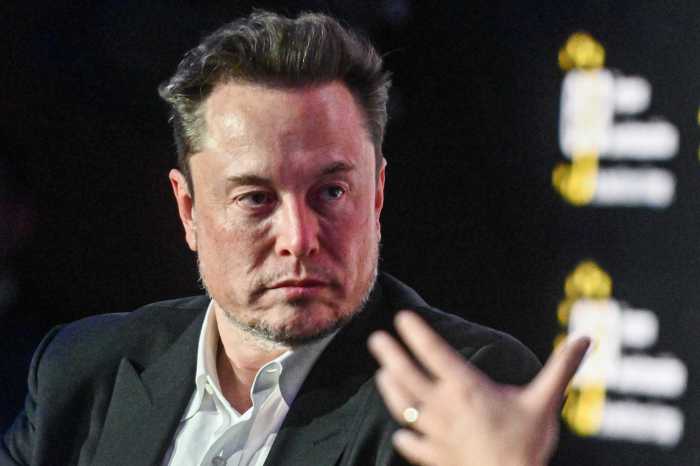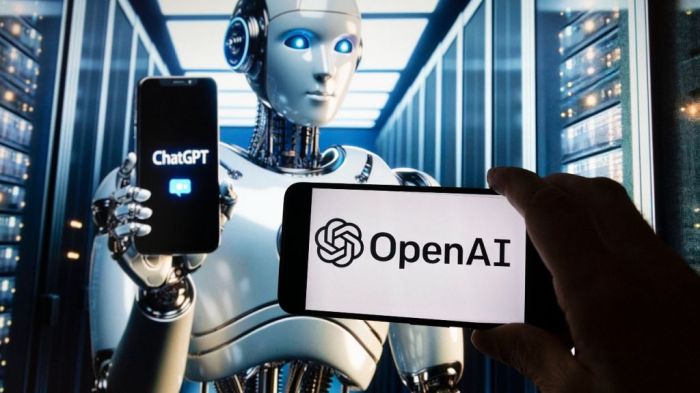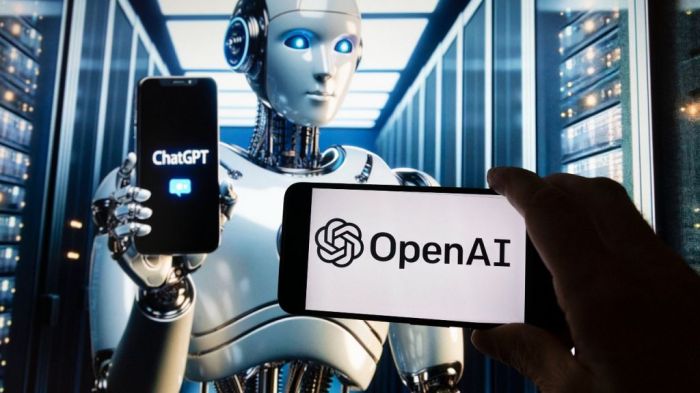OpenAI countersues Elon Musk, escalating the already heated battle between the AI giant and the tech entrepreneur. This countersuit marks a significant escalation, pushing the boundaries of the legal and technological landscape. Musk, a co-founder of OpenAI, alleges a breach of contract and fiduciary duty, while OpenAI counters with claims of its own. The case promises to be a complex and protracted legal battle with far-reaching implications for the future of artificial intelligence.
The dispute centers around the very nature of OpenAI’s development and the responsibilities of its founders. Musk’s initial allegations are detailed in the lawsuit, setting the stage for OpenAI’s counterarguments. This legal clash isn’t just about money; it’s about the future of AI and the power it holds.
Background of the Dispute

The recent legal battles between OpenAI and Elon Musk are a complex entanglement of technological ambition, intellectual property concerns, and accusations of malicious intent. This dispute stems from a long history of both collaboration and contention between the two entities, particularly revolving around the development and deployment of artificial intelligence. Musk’s involvement with OpenAI, a company he co-founded, and his subsequent departure, coupled with his criticism of its current trajectory, form the backdrop for this ongoing legal conflict.The central issue lies in the evolving landscape of AI development.
Musk’s departure from OpenAI was marked by differing visions for the future of artificial intelligence. The countersuit, as a direct response to OpenAI’s claims, highlights the growing tension between those who advocate for controlled development and those who seek a more open and competitive market. The accusations made by each party represent fundamental disagreements about the ethical and practical implications of advancing this powerful technology.
History of the Relationship Between OpenAI and Elon Musk
Elon Musk played a significant role in the early stages of OpenAI’s development. His initial investment and involvement aimed to create a non-profit AI research company focused on the safe and beneficial development of artificial intelligence. Musk’s motivation was largely rooted in the concern that unchecked AI development could pose a risk to humanity. However, disagreements about the company’s future direction, its funding, and its relationship with commercial applications ultimately led to his departure.
Key Events Leading Up to the Countersuit
The escalating tensions between OpenAI and Elon Musk manifested in several key events, culminating in the filing of the countersuit. These events included public criticisms of OpenAI’s direction, allegations of misuse of intellectual property, and differing opinions on the appropriate level of regulation for AI development. The disagreements about the company’s future trajectory, the financial aspects of the company, and the appropriate level of regulation for AI development became major points of contention.
Initial Allegations Made by Each Party
OpenAI’s initial lawsuit against Musk and others focused on allegations of breach of contract and misappropriation of confidential information. They argued that Musk’s actions, after his departure, had harmed the company’s reputation and violated agreements made during his tenure. The allegations centered around the idea that Musk’s public criticisms and actions were damaging to OpenAI’s operations.Musk, in response, countered these claims with accusations of improper use of proprietary technology and the improper handling of internal documents.
He argued that OpenAI was not adhering to the principles he had envisioned for the company’s development and that its actions were detrimental to the broader public interest. The countersuit presented a strong case that OpenAI’s development and actions were against the stated goals and intentions of the organization.
Arguments Presented in the Initial Lawsuits
OpenAI’s legal arguments revolved around contract violations, alleging that Musk’s actions violated agreements made during his time with the company. They also argued that the actions of Musk and others had harmed OpenAI’s reputation and that their actions were damaging to the company’s ongoing projects. The legal arguments presented by OpenAI were mainly based on contractual issues and the alleged harm caused to the company.Musk’s arguments focused on the misuse of intellectual property and the improper handling of internal documents.
He argued that OpenAI had not followed the principles he had advocated for and that its current direction was detrimental to the public interest. Musk’s arguments primarily revolved around accusations of improper use of intellectual property and the mishandling of confidential documents. This represented a strong case against the actions of OpenAI and its possible implications for the future.
Core Issues of the Countersuit
OpenAI’s countersuit against Elon Musk hinges on significant allegations of breach of contract and fiduciary duty, potentially setting a precedent for future disputes in the tech sector. The suit argues that Musk’s actions, including public statements and tweets, harmed OpenAI’s reputation and financial standing, ultimately exceeding the bounds of acceptable conduct within their business relationship. The financial ramifications of these claims could be substantial, and the legal precedents established could reshape how companies navigate public pronouncements and contractual obligations.
Specific Claims in the Countersuit
OpenAI’s countersuit alleges that Musk’s actions, including public statements and tweets, were not only misleading but also directly violated the terms of their agreement. The suit contends that these actions caused significant reputational damage and economic harm to OpenAI. Specifically, OpenAI argues that Musk’s public pronouncements were intended to undermine their position and damage their business prospects.
Alleged Breaches of Contract and Fiduciary Duties
OpenAI asserts that Musk’s actions constituted a breach of contract and fiduciary duty. The suit likely details specific clauses in the agreement that Musk allegedly violated. A breach of contract occurs when one party fails to uphold the terms of a legally binding agreement. A breach of fiduciary duty involves a violation of the trust and confidence placed in a party with a special relationship, such as a director or officer of a company.
In this context, the argument is that Musk’s public statements betrayed the trust placed in him as a stakeholder and potentially violated explicit or implicit contractual obligations.
Financial Implications of the Allegations
The financial implications of these allegations are significant. OpenAI likely seeks compensation for damages suffered as a result of Musk’s actions. This could include lost revenue, decreased market value, and the cost of remedial measures to repair the damage to OpenAI’s reputation. The specific amounts claimed will be crucial to understanding the potential financial impact of the case.
Cases of similar nature have resulted in substantial financial awards, setting a benchmark for the potential outcomes.
Potential Legal Precedents
The countersuit could establish several important legal precedents. If successful, it could set guidelines for how public figures and stakeholders should conduct themselves in relation to contractual agreements and the impact of their statements on the reputation and financial standing of companies. It could also affect the way public statements and social media activity are evaluated in legal disputes.
Similar cases involving public pronouncements and their impact on business relationships provide examples of the potential precedents that could be established. A precedent set in this case could shape future interactions and agreements in the tech sector, influencing future conduct and accountability.
Legal Strategies and Arguments
The legal battle between OpenAI and Elon Musk is not just about the future of artificial intelligence; it’s a clash of legal strategies and interpretations of existing frameworks. Both parties are employing intricate arguments to bolster their respective positions, potentially setting precedents for future disputes in the burgeoning AI landscape. Understanding these strategies is crucial to comprehending the potential outcomes and the broader implications for the development and regulation of AI.The legal strategies employed by OpenAI and Elon Musk reflect their distinct positions and interests.
So, OpenAI’s countersuit against Elon Musk is definitely grabbing headlines. It’s all about the AI battle, but while you’re pondering the legal wrangling, check out the trailer for the Nina Simone biopic featuring Zoe Saldana. It’s a fascinating glimpse into the life of a musical icon, and honestly, it makes me think about how technology and creativity are so intertwined, kind of like how OpenAI’s AI is evolving, just like the legacy of Nina Simone, as shown in nina simone movie trailer zoe saldana.
Hopefully, this legal fight doesn’t overshadow the incredible creative talent that’s emerging in the world, especially when it comes to telling powerful stories. It all circles back to the fundamental questions about innovation and ownership in the tech world, and the OpenAI/Musk case highlights that beautifully.
OpenAI, as the innovator and owner of the technology, likely emphasizes the novelty and potential benefits of their AI, while Musk, concerned about the safety and societal implications, emphasizes the risks and the need for responsible development. The legal strategies will need to balance the rights and responsibilities of each party in the context of the evolving AI landscape.
OpenAI’s Legal Strategy
OpenAI’s legal strategy likely focuses on the defense of its intellectual property rights and the validation of its innovative AI models. They are likely to emphasize the unique characteristics of their models, highlighting the sophisticated training methods and the significant investment in research and development. The argument might focus on the distinction between the generative capabilities of their models and the potentially harmful outputs that are the subject of Musk’s complaint.
OpenAI may also argue that their models are not responsible for the misuse of their technology, and that the responsibility for ethical use rests with the end-users.
Musk’s Legal Strategy
Musk’s legal strategy likely centers on the potential harm caused by OpenAI’s models, focusing on the risks posed by the technology. Arguments may include the potential for misuse, the lack of transparency in the training process, and the potential for bias in the outputs. He might also contend that OpenAI has not adequately addressed the potential risks associated with the technology’s deployment.
The focus might be on holding OpenAI accountable for the potential societal consequences of their technology.
Potential Legal Precedents
This case has the potential to set significant legal precedents in several areas, particularly regarding the liability of AI developers for the misuse of their technology. The court’s decisions will shape the future legal landscape, providing guidelines for the development and regulation of AI in the future. The precedents set here could influence future legal battles over the responsibilities and liabilities of AI developers.
Potential Outcomes of the Legal Proceedings
The potential outcomes of the legal proceedings range from a simple dismissal of Musk’s claims to a significant ruling that could reshape the development and deployment of AI. A favorable ruling for Musk could potentially impose significant restrictions on OpenAI’s operations, while a favorable ruling for OpenAI could reinforce the rights of AI developers and set a precedent for similar cases in the future.
OpenAI’s countersuit against Elon Musk is definitely grabbing headlines. While the tech world is buzzing about this legal battle, it’s interesting to consider how features like the iOS 12 keyboard trackpad cursor and 3D Touch on iPhones and iPads influenced user interaction in a way that’s somewhat analogous to the complexities of AI development. Ultimately, both cases highlight the intricate and often surprising ways technology evolves, and the potential for both innovation and conflict.
The outcomes will likely depend on the specifics of the legal arguments, the evidence presented, and the interpretation of the applicable legal framework.
Relevant Legal Framework
The relevant legal framework for this case is likely to involve existing intellectual property law, contract law, and potential emerging laws specific to AI. The court will need to consider the balance between protecting intellectual property rights and promoting the responsible development and deployment of potentially harmful technologies. Existing frameworks will be examined to understand their relevance to the innovative AI technologies, and the need for potential new regulations to address the novel issues.
Impact on the AI Industry

The OpenAI vs. Elon Musk legal battle, with its countersuit, is a significant development with potential ripples throughout the AI industry. This legal dispute, encompassing accusations of intellectual property infringement and unfair competition, is likely to impact future collaborations, investments, and the very development of AI technologies. The outcome could also influence the regulatory landscape surrounding AI. Understanding the potential implications is crucial for stakeholders in the field.The legal proceedings raise profound questions about the ownership of AI innovations, the boundaries of competition in a rapidly evolving technology sector, and the responsibility of tech companies in shaping the future of AI.
The outcome of this case will set a precedent for future disputes and shape the development trajectory of the industry for years to come.
Potential Effects on Future Collaborations
The legal battle’s impact on future AI collaborations is likely to be significant. The outcome could either foster greater caution and skepticism in partnerships or encourage more transparency and careful contract negotiations. Companies might be hesitant to collaborate with competitors, particularly those perceived as potential threats. The fear of future lawsuits could lead to a more cautious approach, with increased emphasis on intellectual property protection and contractual safeguards.
Existing partnerships could be scrutinized, leading to renegotiations or even dissolution.
Impact on Investment Decisions
The case’s implications for future investments in AI are considerable. Investors will likely scrutinize the legal risks associated with funding AI projects, especially those involving companies with potential conflicts of interest or a history of litigation. Companies perceived as being at higher legal risk may find it more difficult to secure funding, potentially hindering the development of innovative AI technologies.
This scrutiny could shift investment toward more established, or seemingly less litigious, companies.
Influence on AI Development and Deployment
The ongoing legal battle will undoubtedly affect the development and deployment of AI technologies. The potential for protracted legal challenges could slow down the pace of innovation. Companies may delay the release of certain AI products or services, waiting for the legal outcome to provide clarity on the rights and obligations surrounding these technologies. Furthermore, the case could lead to the development of more robust and comprehensive intellectual property protection strategies for AI-related innovations.
The development of new and more sophisticated AI models could be impacted by the need for comprehensive legal and ethical safeguards.
Implications for Regulatory Environments
The legal battle may have substantial implications for the development of AI regulatory frameworks. The case could prompt policymakers to address concerns about intellectual property protection, data security, and liability for AI-related harms. This could lead to the creation of more stringent regulations governing the development and deployment of AI systems. It could also accelerate the adoption of ethical guidelines and standards for AI development and usage.
The case might also spur discussions on the need for independent bodies to evaluate and certify AI systems for safety and reliability.
Public Perception and Reactions
The countersuit filed by OpenAI against Elon Musk has ignited a firestorm of public discussion, exposing diverse viewpoints on the future of artificial intelligence and the ethical implications of its development. Public reactions have ranged from concern over the potential for a tech war to a more nuanced understanding of the complexities involved. This complex situation has dramatically affected public perception of AI’s potential, and it remains to be seen how these events will shape future innovation.The dispute, pitting a leading AI company against a prominent tech entrepreneur, has amplified the public’s awareness of the potential for conflict within the burgeoning field of AI.
This increased awareness, while sometimes sensationalized, has spurred a wider conversation about the responsible development and deployment of advanced AI technologies.
Public Opinion on the Dispute
The public’s response to the countersuit is multifaceted and reflects varying degrees of understanding about the underlying issues. Some view the conflict as a predictable clash between competing interests within the tech industry, emphasizing the inherent conflicts and competition that drive innovation. Others see the situation as a cautionary tale about the potential for unchecked technological advancement, highlighting the need for greater regulatory oversight and ethical considerations.
Still others focus on the personal and professional rivalry between the individuals involved.
Analysis of Public Perception of AI
The OpenAI vs. Musk countersuit has impacted public perception of AI in several ways. On the one hand, it has highlighted the significant financial stakes involved in AI development and the potential for high-stakes legal battles within this emerging field. This, in turn, has raised concerns about the financial interests that may potentially influence AI development and deployment. On the other hand, it has also brought attention to the potential benefits of AI, such as its role in solving complex problems, automating tasks, and improving efficiency across various sectors.
Ultimately, the public’s perception of AI is becoming increasingly complex and nuanced, reflecting the evolving nature of the technology itself.
Impact on Public Trust and Future Development
The ongoing legal battle between OpenAI and Musk is likely to affect public trust in AI. While the specifics of the dispute remain unclear, the potential for further legal challenges and public scrutiny could deter investors and hinder future development efforts. A public perception of uncertainty around AI could lead to a reduction in funding for AI research and development.
It is also possible that the conflict will accelerate the development of regulatory frameworks designed to mitigate risk and ensure responsible AI innovation. This will require a nuanced approach to balancing innovation with potential societal consequences.
Different Perspectives on the Implications
Different segments of the public interpret the implications of this conflict in varying ways. Some see the clash as a natural outcome of the cutthroat competition in the tech industry, while others view it as a symbol of the need for stronger ethical guidelines and regulatory oversight in AI development. Experts in AI ethics, policy makers, and the general public are engaged in a complex dialogue about the long-term implications of this dispute.
It remains to be seen how the conflict will affect the public’s willingness to embrace AI in the future.
Potential Outcomes and Implications: Openai Countersues Elon Musk
This legal battle between OpenAI and Elon Musk has the potential to reshape the future of artificial intelligence. The outcome will not only affect the companies involved but also the broader industry and public perception of AI development. Understanding the potential ramifications is crucial for stakeholders and observers alike.
OpenAI’s countersuit against Elon Musk is definitely grabbing headlines. Meanwhile, Samsung’s latest phone, the Galaxy A14 5G, has just been launched! This new phone boasts impressive features at a great price point, which is likely to appeal to many consumers, while the OpenAI vs Musk legal battle continues to unfold. It’s a fascinating juxtaposition of tech titans, isn’t it?
Potential Outcomes for OpenAI
The success of OpenAI’s defense hinges on several factors, including the strength of its legal arguments and the persuasiveness of its evidence. A favorable ruling could significantly bolster OpenAI’s reputation and solidify its position as a leading player in the AI sector. Conversely, an unfavorable outcome could damage its credibility, potentially impacting investor confidence and future funding opportunities. A prolonged legal battle, regardless of the outcome, could also divert resources from product development and innovation.
- Favorable Ruling: A victory would enhance OpenAI’s public image and bolster investor confidence. This could lead to increased funding and market share. Furthermore, it could set important legal precedents regarding the use of AI in the future.
- Unfavorable Ruling: A loss could lead to a significant decrease in investor confidence, hindering future funding and potentially forcing the company to restructure or even consider selling off parts of its business.
- Settlement: A settlement could provide a more immediate resolution, but may come with conditions that limit future development or compromise the company’s autonomy.
Potential Outcomes for Elon Musk, Openai countersues elon musk
Elon Musk’s actions and motivations are central to the case. A favorable outcome for OpenAI could reflect negatively on his public image and credibility, while a favorable ruling for Musk could potentially damage OpenAI’s standing. The impact on his public persona and future ventures could be substantial.
- Favorable Ruling: A win for Musk could reinforce his reputation as a vocal critic of large language models and their potential risks. However, the ruling may also raise questions about the feasibility and practicality of his concerns.
- Unfavorable Ruling: A loss could tarnish his image and influence, potentially affecting his ability to attract investors for future ventures. This could impact his reputation in the tech industry.
- Settlement: A settlement could allow Musk to maintain a public stance on AI concerns while avoiding significant repercussions. It could be seen as a tactical win.
Long-Term Effects on the AI Industry
This legal dispute could significantly influence future AI development and regulation. A favorable ruling for OpenAI could foster a more permissive environment for AI innovation, while an unfavorable outcome could lead to stricter guidelines and increased scrutiny.
- Increased Scrutiny: The case could prompt a more thorough examination of AI development practices, leading to potential regulations and stricter guidelines.
- Innovation Restraint: A negative outcome could potentially slow down AI development as companies are hesitant to push the boundaries for fear of legal repercussions.
- Public Discourse: The case will likely fuel further public discourse and debate about the ethical implications of AI and its future role in society.
Potential Scenarios and Financial Impacts
| Scenario | Outcome for OpenAI | Outcome for Elon Musk | Financial Impact (Example) |
|---|---|---|---|
| OpenAI Victory | Increased investor confidence, potential for expansion | Damage to public image, potential for reduced influence | OpenAI: $1B increase in market capitalization, Musk: $0.5B decrease in personal net worth |
| Musk Victory | Reduced investor confidence, potential for legal challenges | Reinforced reputation as critic of AI | OpenAI: $1B decrease in market capitalization, Musk: minor financial impact |
| Settlement | Avoids long-term legal battle | Maintains a public stance | OpenAI: $0.5B in legal fees saved, Musk: $0.25B in legal fees saved |
Illustrative Case Examples
This section delves into historical precedents in the tech industry, offering insights into similar legal battles and the strategies employed. Analyzing past cases provides valuable context for understanding the potential outcomes of the OpenAI-Musk dispute, highlighting lessons learned from previous legal skirmishes in the tech sector.
Apple vs. Samsung
The Apple vs. Samsung patent infringement case serves as a significant example of a tech company dispute. This protracted legal battle involved accusations of copying design elements and features, culminating in a series of rulings and settlements. Apple successfully argued that Samsung’s products infringed on its intellectual property rights. This case demonstrates the importance of protecting proprietary designs and technological innovations within the highly competitive tech landscape.
The legal precedents set in this case, and others like it, shape the current landscape of IP protection.
Google vs. Oracle
Another noteworthy example is the Google vs. Oracle case, a complex dispute over Java API code. Google argued that its use of the code fell under fair use principles. The case highlighted the nuances of copyright law in the context of software development, emphasizing the importance of clear delineations in software licensing and usage. This case underscores the difficulty of defining fair use and the challenges in interpreting intellectual property rights in the digital age.
Historical Context of Tech Disputes
| Case | Key Issues | Outcome | Lessons Learned |
|---|---|---|---|
| Apple vs. Samsung | Patent infringement, design copying | Apple secured significant settlements and rulings | Protecting proprietary designs is crucial; litigation can be lengthy and costly |
| Google vs. Oracle | Copyright infringement of Java API code; fair use | Google prevailed on some counts; complex legal landscape | Copyright interpretation in software is complex; clear licensing is essential |
| Microsoft vs. various competitors | Dominance and anti-competitive practices | Varying outcomes, including antitrust rulings | Monopolies and anti-competitive practices are closely scrutinized; maintaining fair competition is vital |
The table above summarizes key elements of past tech disputes, providing a snapshot of the legal battles and their outcomes. This historical overview underlines the crucial role of intellectual property rights and competitive practices in shaping the tech industry.
Comparison of Strategies
Comparing strategies employed in the OpenAI-Musk case with past examples reveals similarities and differences. The focus on patent infringement, design copying, or the use of existing code is a recurring theme in tech disputes. In past cases, like Apple vs. Samsung, the legal strategies often centered around demonstrating the extent of copying and the damage caused by the infringement.
The specific strategies in the OpenAI-Musk case will likely depend on the specific claims made.
Lessons Learned
Previous legal battles within the tech industry have highlighted the significance of meticulous record-keeping and strong legal representation. Thorough documentation of development processes, licensing agreements, and intellectual property claims is essential. Companies must also carefully consider the potential impact of their actions on competitors and the broader industry. The importance of strategic legal counsel is evident in successful cases.
Timeline of Events
The OpenAI vs. Elon Musk countersuit is a complex legal battle with a winding path. Understanding the key dates and milestones is crucial to grasping the nuances of the dispute. This timeline provides a clear overview of the events leading up to and surrounding the countersuit.
Key Dates and Milestones
The following timeline Artikels significant events in the OpenAI vs. Elon Musk legal dispute, highlighting pivotal moments and their implications. Each date represents a critical point in the ongoing saga.
- 2023 (Approximate): Initial discussions and disagreements between OpenAI and Musk regarding the future of AI development and regulation begin. This period is marked by evolving views and concerns. The exact dates of these discussions are difficult to pinpoint.
- Q3 2023: Public statements and controversies surrounding the role of AI and its potential risks emerge. These pronouncements fuel the escalating tension between OpenAI and Musk.
- Late 2023: Elon Musk publicly criticizes OpenAI’s actions and intentions, creating a public rift and setting the stage for the potential legal action.
- Early 2024: OpenAI files its countersuit against Musk, detailing alleged breaches of contract and defamation. This formal legal action signifies a significant escalation in the dispute.
- February 2024: Musk responds to the countersuit with a counter-argument, outlining his defense and rebuttals to OpenAI’s claims. The legal battle enters a new phase with opposing arguments being presented.
- March 2024: Legal filings and motions are exchanged between both parties, with each side presenting evidence and arguments to support their positions. This period marks the exchange of key documents in the legal proceedings.
- April 2024: A preliminary hearing or court date is scheduled, setting the stage for the next phase of the legal proceedings. This is a critical date marking the formal commencement of the trial or a crucial stage in the case.
- Ongoing: Further legal maneuvering, discovery, and potentially a trial date, are set in motion. This period of the legal battle is characterized by further legal arguments, evidence gathering, and potential trial dates.
Timeline Visual Representation
A comprehensive timeline would typically use a visual format, such as a Gantt chart or a timeline graphic, to show the sequence of events and their durations. Such a visualization would make the timeline easier to grasp and understand. Unfortunately, I cannot create images.
Last Point
The OpenAI vs. Elon Musk legal battle is a landmark case with potentially massive implications for the AI industry. The countersuit underscores the complex interplay of financial interests, ethical considerations, and the evolving landscape of artificial intelligence. The outcome of this case could set important precedents, shaping the future of AI development, collaborations, and regulations. The public’s response, and the reactions from industry leaders, will be closely watched as the legal proceedings unfold.






